17 Strong Scents Dogs Can’t Stand and How They Show It
Your dog’s nose is a superpower—far more sensitive than yours. While we might shrug off strong smells or even enjoy them, dogs can find certain scents downright offensive.
From cleaning sprays to spicy foods, some everyday items we use or keep around the house could be making your pup miserable. And they’re not always subtle about it.
Dogs have a whole playbook of reactions to smells they hate—sneezing, head shaking, lip licking, even an abrupt exit from the room.
Understanding which scents bother them can help you create a more comfortable, stress-free environment for your four-legged friend.
So if your dog seems twitchy, sneezy, or suddenly camera-shy around your favorite candle, this list might explain why. Here are 17 strong scents dogs can’t stand—and the telltale ways they let you know.
1. Citrus (Oranges, Lemons, Limes)
Most humans associate citrus with freshness, but to dogs, it’s a full-on sensory assault. Their heightened sense of smell means even a single slice of lemon or a spritz of orange cleaner can feel overwhelming.
Dogs often show their distaste by turning their head away, sneezing repeatedly, or giving you a wide-eyed look of betrayal before exiting the room like it’s filled with toxic fumes.
If your pup suddenly avoids the kitchen after you’ve cleaned with lemon-scented spray, the citrus might be to blame. Some dogs will even rub their face on the carpet or against furniture in an attempt to “erase” the offending scent from their snout.
While citrus peels are often used in pet deterrents for this very reason, it’s best to be cautious—dogs don’t just dislike it, they can be truly stressed by prolonged exposure.
2. Vinegar
Though vinegar is a common natural cleaner, it’s anything but neutral to your dog. Its sharp, acidic odor can make dogs wrinkle their noses, sneeze uncontrollably, or walk in tight little circles as if trying to escape the invisible cloud.
Even small amounts left behind on floors or surfaces may cause your dog to avoid those spots altogether.
While it’s not harmful in small doses, vinegar can definitely irritate a dog’s senses. If your pup starts licking their lips nervously or leaves the room after you’ve cleaned with it, chances are their nose is overwhelmed.
Some dogs will give a low grunt or sigh, like they’re trying to “push” the smell away. If you use vinegar in your home regularly, make sure there’s proper ventilation and your dog has a way to leave the area.
3. Ammonia-Based Cleaners
To a dog, ammonia doesn’t just smell bad—it smells dangerous. This powerful chemical shares scent similarities with the compounds found in predator urine, which can put dogs on high alert.
It’s not uncommon to see dogs back away, bark at the source, or even whimper when they detect it in the air.
Some dogs will become visibly agitated, pacing or sniffing frantically, unsure of whether they’re in danger or just uncomfortable. Others may avoid the entire room long after the scent has faded to human noses.
Using ammonia-based products indoors can create an environment that your dog associates with fear or stress.
If your dog suddenly refuses to enter a room you’ve just cleaned, don’t be surprised—ammonia could be setting off all their internal alarm bells.
4. Rubbing Alcohol
Rubbing alcohol has an acrid, sterile scent that hits dogs like a punch to the nose. Just a few drops can prompt reactions like head shaking, sniffing the air anxiously, or pulling away from your hand if it’s on your skin.
While humans often tolerate or even appreciate the “clean” smell, dogs interpret it as an irritant.
They may also lick the air repeatedly, a signal that they’re trying to make sense of the overwhelming odor or flush it from their nasal passages. Some dogs will run off to another room until the smell dissipates.
If you use rubbing alcohol on cuts or to sanitize surfaces, make sure your dog isn’t trapped in the same area. That sterile scent might scream “disinfected” to you—but to your dog, it just screams “get away.”
5. Chili Peppers (Capsaicin)
Spicy foods might be a thrill for humans, but for dogs, chili peppers are a serious offense. The compound capsaicin, which gives chili its heat, can irritate their nose and eyes even without a single bite.
If a dog sniffs a pepper or anything spicy, you might see them paw at their face, squint, or retreat quickly with their tail lowered.
Dogs may also sneeze violently or shake their head in response to the intense scent. Some even make a dramatic show of licking the floor and drooling, trying to clear the residual irritation from their senses.
Spicy fumes wafting through the kitchen can be enough to make them flee under a bed. For your pup’s sake, keep the hot stuff sealed tight—and don’t let them near the cutting board after taco night.
6. Perfume and Cologne
What smells divine to you might be your dog’s personal nightmare. Perfumes and colognes are full of synthetic fragrances that can overwhelm a dog’s super-sensitive nose.
After a spritz, you might notice your dog avoiding your lap, rubbing their face on the couch, or sneezing in protest.
Some dogs react by licking their lips or constantly sniffing the air like they’re trying to figure out what changed. Others may actively avoid you for a while until the smell fades.
This isn’t because they’re mad—it’s because their nose is practically under attack. Heavily scented body sprays can also cling to dog fur if they’re nearby during application, making the effect last even longer.
If your dog hides after you get ready, it’s not personal—it’s just perfume.
7. Nail Polish and Remover
The smell of nail polish and acetone-based remover can be downright suffocating for dogs.
These products release harsh fumes that quickly fill a room, and dogs often respond by sneezing, pacing, or pawing at their noses. You might notice your pup leave the room entirely or hide in a quieter corner of the house.
Some dogs whimper or bark when they detect the smell, not out of fear of the polish itself, but because the sharp chemical odor is too intense. Dogs that are more sensitive may even start to tremble or avoid you for a bit.
If you notice them rubbing their face on the floor or trying to bury their head in a blanket, they’re signaling distress. It’s best to polish your nails in a well-ventilated area—ideally, far from your four-legged friend.
8. Cigarette Smoke
Just like humans, dogs can find cigarette smoke irritating—and even harmful. Their reactions range from coughing and sneezing to walking away with squinting eyes and a lowered head.
Since their sense of smell is so much stronger, what lingers lightly in the air for you may feel like a thick, inescapable cloud to them.
Some dogs will avoid smoky rooms altogether, while others might stay but act anxious or restless. Long-term exposure isn’t just annoying for them—it can actually lead to respiratory issues, just as it can in humans.
If your dog starts wheezing, excessively licking their nose, or rubbing their face around smoky areas, they’re not being dramatic. They’re asking for clean air.
Creating a smoke-free zone—or quitting altogether—is a powerful act of love for your pup’s health and comfort.
9. Mothballs
These small, strong-smelling balls may keep pests away, but they can have an equally repellent effect on your dog.
The scent is so potent that many dogs will instantly turn away, whine, or even attempt to bury the offending object. Mothballs aren’t just offensive—they’re also toxic if ingested, making them especially dangerous for curious noses.
Dogs might sniff and then backpedal, or start sniffing the floor repeatedly as if trying to identify and avoid the chemical trail. You might also notice them avoiding closets or drawers where mothballs are kept.
Their reactions are usually pretty clear: discomfort mixed with avoidance. If you want to repel moths without triggering your dog’s defense system—or risking their health—opt for pet-safe alternatives.
Mothballs may be old-school, but to your dog, they’re just plain awful.
10. Garlic
While some humans love the smell of garlic roasting in the kitchen, dogs tend to disagree—strongly.
A dog that catches a whiff of garlic may back away, sneeze, or give the classic “grossed out” look: ears down, nose wrinkled, and head tilted in confusion.
Some will even try to paw at their face or rub it along the carpet as if trying to get rid of the smell.
Garlic also contains compounds that are toxic to dogs if consumed in large amounts, so the instinct to stay away is actually a protective one.
If your dog tries to dig or bury garlic cloves—or flat-out avoids you when you’re cooking—it’s not a coincidence. They’re reading their instincts loud and clear: “this doesn’t smell safe.” And honestly, they might be onto something.
11. Onions
Like garlic, onions give off a pungent scent that’s unpleasant to most dogs. Whether raw, sautéed, or powdered, the sharp aroma often results in a wrinkled nose, a few rapid sniffs, and then an unceremonious retreat from the kitchen.
Some dogs will walk in, catch a whiff, and immediately walk right back out without hesitation.
They might also shake their head or lick the air in response to the overpowering smell. Onions are toxic to dogs when ingested, so their natural aversion may serve a biological purpose.
If your dog starts showing avoidance behavior around onion-heavy meals, they’re not being picky—they’re being smart. You may even notice them attempting to bury onion scraps with their nose.
It’s a pretty clear message: “No thanks, human. That stuff’s not for me.”
12. Peppermint
While peppermint smells refreshing to humans, dogs often find it harsh and overwhelming. Many essential oils, including peppermint, contain concentrated compounds that irritate a dog’s sensitive nose.
When exposed, dogs might sneeze repeatedly, shake their head, or quickly move to a different room. Some will even lick the air, a sign they’re trying to process or get rid of the scent.
You might also notice your dog rubbing their face against furniture or pawing at their nose in discomfort.
While some pet products use diluted peppermint oil for flea prevention, a strong whiff from a candle, oil diffuser, or gum wrapper can be too much.
Dogs aren’t trying to be rude if they bolt when you’re using mint-scented products—they’re just trying to get away from what feels like an olfactory ambush.
13. Cleaning Bleach
Few scents are as immediately recognizable—and as unpleasant to dogs—as bleach. Even diluted, bleach gives off fumes that can overwhelm your pup’s sensitive system.
After a good scrub with bleach, dogs might pace nervously, avoid the room, or sniff the floor cautiously before making a hasty retreat. The harsh chemical odor often sends their instincts into high alert.
Dogs may also squint, cough, or lick their lips when exposed to bleach fumes. While it’s a go-to cleaner for many households, it’s best used with care around pets.
If your dog suddenly seems jumpy or restless after a cleaning spree, it’s probably not the vacuum they’re mad at—it’s the smell you left behind. Proper ventilation and pet-safe alternatives can make a huge difference in your dog’s comfort level.
14. Essential Oils (Eucalyptus, Tea Tree, etc.)
Essential oils might be soothing to us, but they’re not always dog-friendly—especially eucalyptus, tea tree, and cinnamon oils.
Dogs exposed to strong essential oil scents may begin sneezing, licking the air, or displaying signs of discomfort like wide eyes and stiff posture. Some dogs will even shake or scratch at their face as if something is stuck to their muzzle.
Since essential oils are highly concentrated, even a small amount can feel intense to dogs. Diffusers, sprays, or even oils applied to human skin can trigger avoidance behaviors.
You might see your dog move to another room or curl up in the farthest corner of the house. While not all oils are toxic, the overwhelming smell alone can be a source of stress. When in doubt, keep your diffuser out of paw’s reach.
15. Skunk Spray (and Similar Musks)
Skunk spray is the stuff of dog nightmares—and not just because of the smell. The sulfur-based compounds in skunk musk are designed to repel, and they do an excellent job with dogs.
If your pup gets sprayed, they’ll likely panic: rolling, rubbing, sneezing, or trying to dig a hole to bury themselves in shame. But even distant whiffs can trigger discomfort.
Dogs that encounter skunk-like odors may act twitchy, rub their face on the ground, or retreat to their bed with a dramatic sigh. Their body language often screams, “make it stop!”
Some commercial pest repellents mimic musky odors, which can trigger similar reactions. If your dog suddenly avoids a specific outdoor area, it might not be the grass—they could be picking up on a musky warning sign you can’t smell.
16. Menthol (from ointments or cough drops)
Menthol has that icy-hot, tingly sensation humans often find soothing—but to dogs, it’s a full-on olfactory assault.
Found in products like chest rubs, pain creams, and cough drops, menthol can cause dogs to lick the air, squint, or shake their head repeatedly. They may avoid you altogether if the scent is on your hands or clothes.
The reaction is usually immediate: a few cautious sniffs, a wrinkled nose, and then a swift retreat. Some dogs will try to rub their face on pillows or blankets to escape the lingering aroma.
Because menthol evaporates quickly, it fills the air fast and can feel suffocating to a dog. If your pup gives you the side-eye when you’re treating a cold, don’t take it personally—they just want their nose back in peace.
17. Strong Cheese (Like Blue Cheese)
While many dogs love a cheesy treat, strong-smelling varieties like blue cheese or Roquefort can push their senses too far.
These pungent cheeses contain mold cultures and fermentation byproducts that create an odor some dogs simply can’t handle.
Instead of begging, your dog might sniff once and recoil dramatically, nose wrinkled and eyes squinting like you’ve offended their very soul.
Dogs that dislike strong cheese may lick the air nervously or try to bury the cheese under a rug or in their bed—classic avoidance behavior. Others may whine or bark at the scent as if warning you not to go near it.
If your pup acts confused or distressed when you unwrap a wedge of something funky, it’s probably not hunger—it’s a protest. For sensitive noses, not all cheese is created equal.























